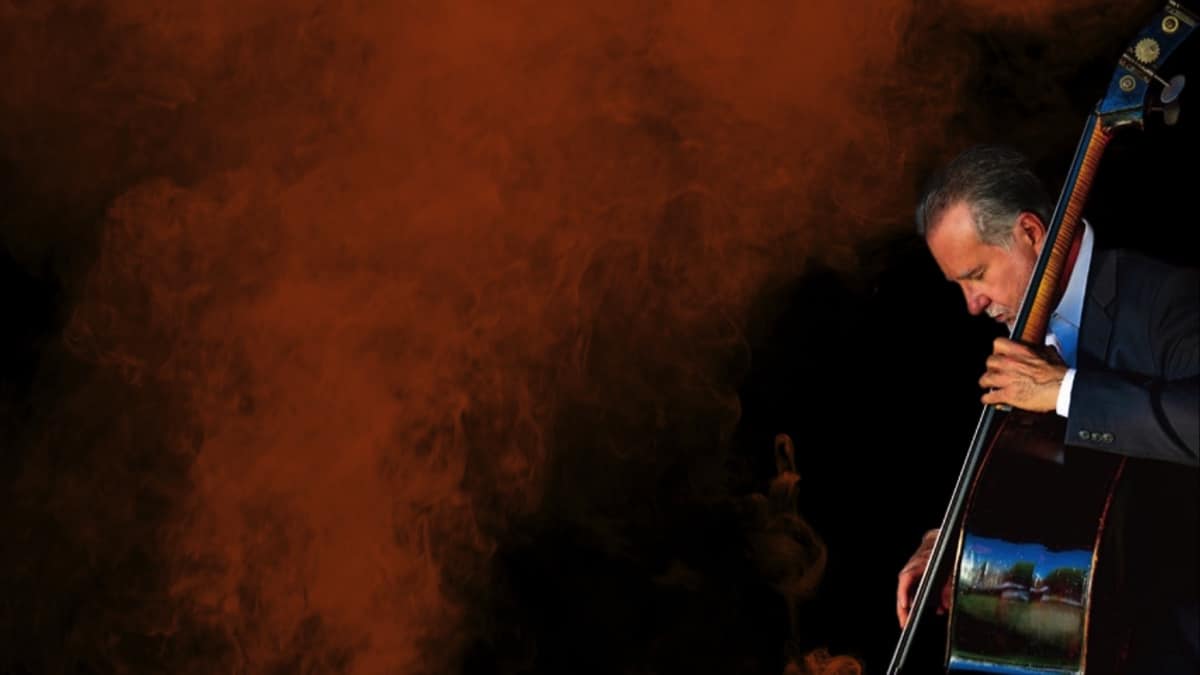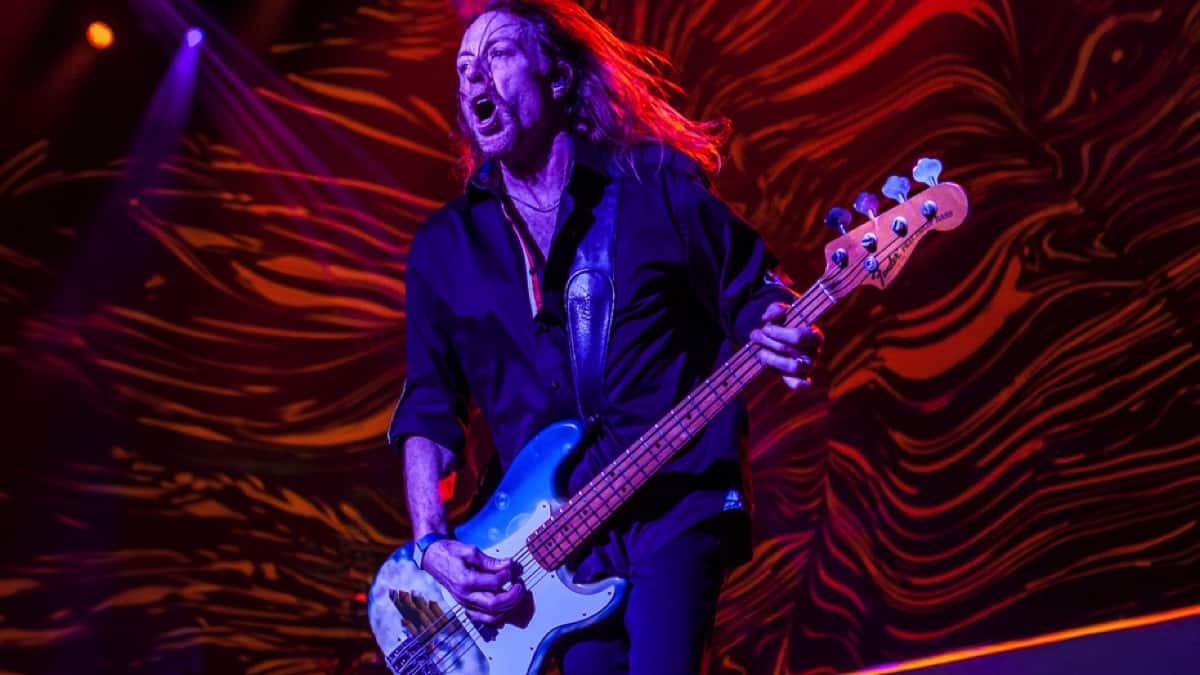Cover
Bass Musician Magazine Featuring Damian Erskine / June 2011 Issue


Damian Erskine in my opinion is a sterling example of that premise. Hard work, perseverance, and an unbridled dedication to his art has caught the attention of those concerned enough to keep an eye out for artists who are challenging music’s limits in some small way. His latest recording effort, Joy Luck, featuring Peter Erskine and Vardan Ovsepian, is a testament to his work ethic and continued devotion to his axe, and his art.
Seriously concerned musicianship for all the right reasons seems to be a bit of a seek and find adventure these days, and I’m recommending Damian be added to that deserving list. Be sure to read through the entire interview, as widening your musical perspective is the heart of what this musician speaks of.
Jake: Let’s start off talking about your latest recording endeavor, Joy Luck, with Peter Erskine and Vardan Ovsepian, a harmonically rich, sensitive, and extremely musical effort I might add. This must have been a milestone for you.
Damian: Thank you. This recording (as well as the tour in S. America which preceded it) was definitely a personal milestone for me. I grew up watching Peter play with so many of my favorite musicians. I had always assumed that, although I knew music was going to be my chosen path, I never thought that I would be lucky enough to work with Peter professionally. Partially, this is because I had never thought of myself as being in the same realm artistically as Peter or the bassists I’ve seen him play with (Jaco, Marc Johnson, Palle Danielson…the list is endless). I’ve also always been solely an electric player, and by the time I was somewhat “up and coming”, Peter was primarily working with uprights bassists in much more acoustic and musically sensitive settings. It was quite a pivotal moment for me when the realization came that I was very much up to the task and could actually contribute something to the sound.
I was somewhat taken back when he asked if I could swing by his house while I was in LA to try out a new trio with pianist Vardan Ovsepian. Quite honestly, I thought, “Well, of course I’ll come by, but the electric bass is just the wrong voice for this material”. I was pleasantly surprised at the immediate connection we had as a group. The music, which is very much an extension of Vardan’s unique (and astoudningly beautiful) voice on the piano, is quite compelling and sensitive, and I was amazed at how well the electric bass worked. I got chills more than once as we ran through a range of material and I found myself playing tunes I had listened to most of my life from Peter’s ECM releases, etc. It was a thrilling experience for me in so many ways, and Peter’s insights into both the music and the way it is to be treated and respected has been immensely enriching for me.

Damian: I have the benefit of knowing Peter well (he was always “Uncle Pete” to me before he was “Peter Erskine, drumming legend”) so I knew that my role was to support the music as much as possible. Playing with Peter is an act of reduction for me. I really tried to center myself and put my ego aside and serve the music first and foremost. I knew that as long as I was serving the music and not trying to do something to impress anyone, it would work…and it does! Beautifully. I really just focused on internalizing the music. I listened to the demos and any previous recordings of some of the tunes daily while driving to gigs or walking my dog. I played the music daily at home to make sure that I didn’t have to waste brain energy on execution of any unison lines, etc. I wanted my whole brain involved with nothing but listening and reacting musically while recording this material. I really focused on the life of every note I played. There are times when I may be playing nothing but half-notes, but I wanted to put every bit of myself into making those half-notes sing.
Jake: With that being said, tell me about your overall focus within your practice time. There are so many variables as far as what to give your musical attention to these days, many that seem to be almost a 180 philosophically. What are your thoughts?
Damian: My focus these days tends to revolve around being 100% focused on what the music is asking of me. This means that I spend time working on getting different tones and sounds, fine tuning articulations, but it also means that I like to spend time on working through anything that gives me fits on a gig.
I work with an immense number of different people in every different kind of setting. Playing over 200 gigs a year, I spend much of my time simply preparing for one gig or another. When I sit down to actually practice something, it’s usually because I stumbled over one thing or another on a gig, or have trouble with a passage or chord progression while preparing for a gig.
Whenever I come across anything that feels difficult or unnatural for me to play, I try and break it down to it’s simplest parts and really focus on it until it becomes more familiar. Quite often, for me personally, it usually winds up being a matter of figuring our how to solo melodically over a given set of changes. I’m very comfortable in my role as a bass player, but have always felt a little bit on thin ice when it comes to soloing, so I spend a lot of time trying to feel more comfortable over certain chord types so I can relax my brain and just play when the time comes (as opposed to thinking so hard that it’s hard to actually listen and interact in a musical way).

Jake: Tell me about your latest book “Right hand Drive”, and how that weaves into your overall approach as well, which I most certainly hear signs of on Joy Luck.

Jake: I know you keep extremely active in the social networking world. How important is that these days to ones career building architecture in your opinion?
Damian: There are a million ways to get it done when it comes to gaining exposure in the music industry, but social networking is incredibly useful for me personally. The key thing that many people miss when it comes to social networking is that it is a SOCIAL experience. You can’t expect to get a million friends a sell-out your shows thanks to facebook or twitter if all you do is post gig notices online. I got into it because I very much enjoyed the music community and love chatting and dialoguing with other musicians and bassists. Because I’ve formed actualy relationships with people, it has worked for me in that regard. I’m reached a much broader audience than I might have otherwise, and I’ve made a TON of great friends. I’ve gotten gigs, recording sessions, DVD shoots, etc, all from my youtube videos, myspace, Facebook, twitter, whatever it is. Also, when someone says “so and so mentioned you so I looked you up online and MAN… you’ve got a ton of stuff up there…You’re everywhere!” It does give a little bit of extra “street cred” I suppose, when there is a bit of saturation. I don’t use it as a tool as well as many, but that’s because I don’t want to get disingenuous with it. I really like it because of it’s ability to connect me with a larger community of musicians and people who are passionate about the things I’m also passionate about.
Jake: Your compositional prowess has shown signs of being on the move as I heard on your last CD So to Speak. Where does this ageless and sometimes mysterious process sit in your musical landscape these days?

I’ve always loved Picasso’s quote, “I only do that which I cannot do so that I may, one day, be able to do it”. That’s kind of how I’ve lived my musical life. I never say no to a gig out of fear, and I always try and rise to any challenge, instead of hiding from possible failure. In order to grow, you have to risk failure, and I’m much more concerned with growing musically than I am being successful at it. I’ve always figured that once I’m good, it’ll happen anyway, so I don’t worry about success so much as I do mastery, and composition is certainly an aspect of musical understanding that I felt I had to immerse myself with.
Jake: I’m going to grab a quote out of my book from Alain Caron that I’m sure you’ll relate to, that being: “In my opinion, a good musician will be influenced right away when hearing different and varied musical perspectives from other cultures.” Your thoughts?
Damian: That’s for sure! I’ve been realizing lately that I’m actually more influenced in a literal way (the way I play) by what I listen to than by what I transcribe, and I’ve certainly become obsessed with music from other parts of the globe. I’ve long been enamored with African and Cuban music for obvious reasons (rhythm!). But lately, I’ve also found myself seeking out music from Israel, Turkey, Eastern block countries. I’m fascinated with how many ways one can perceive and approach both harmony and rhythm…I eat it up!
Jake: Do you find yourself giving any attention, I guess I’ll say consciously or sub-consciously, to the always conceptually tricky development of “your voice” on your instrument, and do you feel this is a component that merits some type of attention?
Damian: I’ve never really thought literally about developing my own voice. I have always assumed that if one works hard enough to get to a place where they are really playing the music from their own perspective, and not just regurgitating someones exact lines or approach, that it’s inevitable that your “voice” will come naturally and organically. I think it’s virtually impossible for someone to come to a place of understanding with music and develop as a player without having at least a little bit of themselves in there. That being said, once certain things have revealed themselves to me as being fairly unique to myself, I do take a look at those things and try and develop them further (like my right hand technique) or, if I didn’t necessarily like that thing, come to an understanding of what it was, where it came from, and how I might better control or develop it into something more along the lines of my ideals for myself. Just like I hate the sound of my voice on an answering machine, there are certain things I can always recognize in my playing that I don’t really like. I’m not sure if that’ll ever cease to be the case, but it keeps me working hard to improve and try to become the bass player that I want to hear.

Damian: Aside from the CD release with Peter Erskine, and future tours with that trio, I continue to tour with Gino Vannelli as well as a number of different artists from one place or another. I’m making it a point to focus on my band a bit more this year (they sound so good, I just can’t NOT try and get them out there) so I plan on recording a live CD in Portland this summer and will try and get some tour support for a European run. I get asked quite a bit to come to the UK and a few other countries, so I’m going to do my best to get out there and do it. Later in the year, Fuzzy music will also be releasing a really well done play-along series for the recording. I’ve been asked for quite some time for an instructional DVD, so I’m kicking around ideas for that as well. But with my schedule, there’s no telling when I’ll actually do it.
My advice would be to check my site occasionally for tour dates, book releases, cd releases, etc. I play with an average of 2 to 4 different bands per week at any given time, so it’s hard to say exactly what’ll happen when. I can say this…the Peter Erskine New Trio will be holding it’s CD release gig at Vittello’s in Los Angeles on June 4th, and the CD is quite beautiful. It’s such an honor for me to be a part of that fantastic trio, and I really encourage people to check that one out.
Bass Videos
Brian Bromberg, Paying Tribute to Scott LaFaro, April 2024

Brian Bromberg, Paying Tribute to Scott LaFaro, April 2024…

Brian Bromberg is one heavy-hitting bass player and I am in awe of his talent as one of the few individuals who is equally proficient on electric and upright bass.
You might remember our conversation back in 2018 when he released his powerhouse Funk album. Brian’s “A Little Driving Music” album is a staple on all our road trips and his Jaco and Jimi Hendrix tribute albums are mind-blowing… and I could go on and on.
Now, Brian has taken on the arduous task of producing an album paying tribute to the late, great, Scott LaFaro. He teamed up with pianist Tom Zink and drummer Charles Ruggiero and Brian delivers a commanding performance on upright. The entire album is a masterpiece and a real treat to listen to track after track.
Join us as Brian shares the details behind this project and more.
Photo, Michel Bocandé
Featured Videos
Visit Online
brianbromberg.net
FB @BrianBrombergBassist
YouTube
Cover
Leland Sklar, Over Half a Century of Bass, March 2024

We all have enjoyed Leland Sklar’s Bass lines for over half a century.

You might remember that we had him on our cover back in 2017 and did an update when he launched his book “Everybody Loves Me” in 2020. It was exciting to hear that The Immediate Family had got back together in the studio to work on their own music in 2019 and are now up to two albums.
Just last December, Magnolia Pictures released a documentary titled “Immediate Family” where we got a behind-the-scenes look at the massive contributions Danny Kortchmar, Waddy Wachtel, Ross Kunckle, Leland Sklar and Steve Postell have made in countless songs that are the very essence of our daily personal musical soundtracks. Seeing the astronomical roster of performers they have supported over many years is very eye-opening. It is a must-see for any music lover!
Now, I am thrilled to bring you a special chat with Leland Sklar where we go more in-depth into the bass side of his musical journey.
Photos: Header, Rob Shanahan – Cover Photo, Jay Gilbert/Chris Schmitt
Featured Videos:
Skin In the Game – https://www.youtube.com/watch?v=QhbnzIrdjJ8
from new album Skin In The Game
The Toughest Girl In Town – https://www.youtube.com/watch?v=UVQLZIRfLjU
from new album Skin In The Game
Fair Warning – https://www.youtube.com/watch?v=1DN18DYwLsU –
from the self-titled album The Immediate Family
Visit Online
www.immediatefamilyband.com/
www.facebook.com/TheImmedFamily
www.instagram.com/theimmedfamily/
Bass Videos
Ricky Phillips, STYX Bass And More – February 2024

Ricky Phillips, STYX Bass And More…

I have always been a huge Styx fan. Their music kept me awake during countless nights studying and gave my imagination a place to escape when I had a moment to take a break.
I had the immense opportunity to chat with STYX bassist Ricky Phillips for our August Cover in 2017 and follow his projects as time passed. Now, I am thrilled to have the opportunity to catch up with Ricky as he has been super-busy over the past six years.
Join me as we take a deep dive into the band’s most recent album “Crash the Crown” and EP “The Same Stardust”. Ricky shares some insights into the herculean team effort behind the scenes and the musical process that keeps them ever so busy and how he has updated his sound.
Without further ado… Here is Ricky Phillips!
Photo: Jason Powell
Featured Videos:
“Crash of the Crown” lyric video
“Reveries” lyric video
“Save Us From Ourselves” lyric video
“Sound the Alarm” lyric video
“Too Much Time On My Hands” Zoom video 2020
Visit online:
www.Styxworld.com
FB & IG @styxtheband
Bass Videos
Jeff Pilson, Foreigner Low End – January 2024

Jeff Pilson, Foreigner Low End – January 2024…

Those of us who were around back in the 70’s remember how certain songs on the radio resonated with us. It turns out that many of these iconic melodies came from Foreigner and they were part of our personal soundtracks!
After all these years, the band is going as strong as ever with Jeff Pilson firing away on bass midstream into a 2-year farewell tour.
I am excited to be able to bring you all the details about Jeff’s musical Journey, the farewell tour in progress, how he gets his sound and his plans for the future.
Cover Photo: Krishta Abruzziini / Video Photos: Krishta Abruzzini, Karsten Staiger, Gina Hyams
Featured Videos
For more news on FOREIGNER and upcoming Farewell Tour dates, fans can visit:
foreigneronline.com
facebook.com/Foreigner
twitter.com/ForeignerMusic
instagram.com/foreignerlive
youtube.com/user/FWebTeam
Also on FB @officialjeffpilson
Bass Videos
Rodney O’Quinn, Rockin’ Hard Through the Years – December 2023

Interview With Foghat Bassist Rodney O’Quinn…

Many rock fans have enjoyed music by Foghat, who originally formed in London back in 1971.
Over the many decades of playing, the band members have changed, leaving behind only Roger Earl as the only original member. Bassist Rodney O’Quinn left the Pat Travers Band and joined the group in 2015 and has been laying down the low end for this iconic quartet keeping the Foghat legacy alive. With a new album titled “Sonic Mojo” which dropped on November 10th, the band is as busy as ever and there is lots of very tasty music to come.
Join me as we learn of Rodney O’Quinn’s musical journey, how he gets his sound, and his plans for the future.
Photos:
Cover, Jake Coughlin
Video Thumbnail, Tom Apathy
Photos used in the video: Kerry Quinn, Chuck Lanza, Kim Granger, Kenneth Strohm, Jake Coughlin, Jay Jylika
Featured Videos:
1st Single from Sonic Mojo – Official “Drivin’ On”
2nd Single from Sonic Mojo – “She’s a Little Bit of Everything Official Video
“Road Fever”- California Mid State Fair – Paso Robles, CA – 7-27-22
“Stone Blue” – Rodney O’Quinn Bass/Lead Vocals – Don Odell’s Legends – Woonsocket, R.I – 10/15/22 – The Stadium Theater
The Earl’s Court – Season 2, Episode 7: Funny Guys
“I Just Want to Make Love to You” – CasinoRama – 6-9-23
FOGHAT “Somebody’s Been Sleepin’ in My Bed” – Mohegan Sun, Uncasville, CT – 1/28/22
“I Just Want to Make Love to You” – California Mid State Fair – Paso Robles, CA – 7-27-22
Visit Online:
www.foghat.com
www.facebook.com/Foghat
www.twitter.com/FOGHAT
www.instagram.com/foghat_official
www.youtube.com/user/FOGHATMUSIC


















